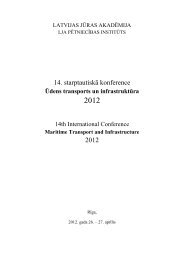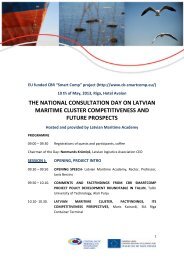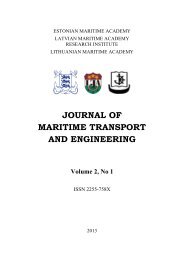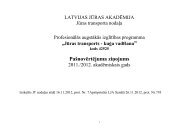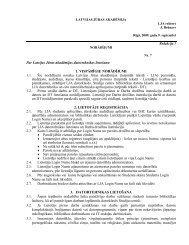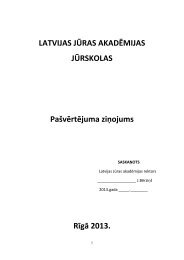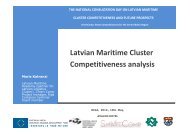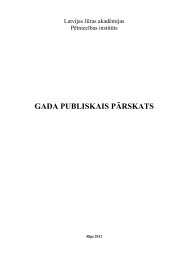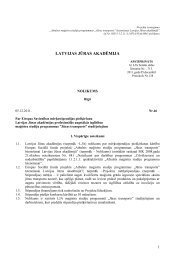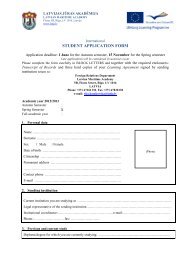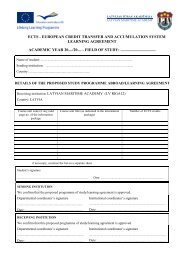Latvian Maritime academy
Latvian Maritime academy
Latvian Maritime academy
You also want an ePaper? Increase the reach of your titles
YUMPU automatically turns print PDFs into web optimized ePapers that Google loves.
Word borrowing may, like other ways of augmenting the vocabulary, be motivated by the need for<br />
adequate denotation of new cognitive contents or concepts arising in the process of the material and<br />
spiritual development of society [5]. English borrowed an immense number of words from the French of<br />
the Norman invaders. And so the process has continued uninterruptedly down to the present day, each<br />
cultural wave bringing to the language a new deposit of loan-words.<br />
When in two languages we find no trace of the exchange of loanwords one way or the other, we are<br />
safe to conclude that these two nations have had nothing to do with each other. But if they have been in<br />
contact, the number of loan words will inform us of their reciprocal relations, the influence they have had<br />
on each other and in what domains of human activity each has been superior to the other. The study of<br />
language proves the fact that when one nation produces something that its neighbours think worthy of<br />
imitation they will take over not only the thing, but also the name. Loan words are nearly always<br />
technical words belonging to one special branch of knowledge or industry, and may be grouped so as to<br />
show what each nation has learnt from the other [6].<br />
The Influence of Latin on English<br />
Much of the vocabulary of formal English is of Latin origin. In contrast, informal language is<br />
characterised by vocabulary of Anglo-Saxon origin e.g. commence, continue, conclude {formal}; begin,<br />
keep up, end {less formal}. Formality can be applied to aspects of the situation in which communication<br />
takes place and to the features of language which correlate with those aspects [7].<br />
Latin has since the earliest period of the history of English been one of the principal donor<br />
languages in the expansion of the English vocabulary. A great many of the lexical items which can<br />
ultimately be traced back to Latin have entered the English language indirectly via French and various<br />
other Romance languages, which together with Latin probably contributed almost two thirds of the word<br />
stock of present day English.<br />
A substantial part of Latin and Greek loans which have survived to the present day were first<br />
introduced as particular terms in science e.g. theory (Gr), praxis (Gr), system (Gr), method (Gr),<br />
atmosphere (Gr),radius (L), formula (L), calculus (L), notion (L), concept(L), satellite(L), exist(L), etc.<br />
[1] Sometimes quite a number of English words come from just one Latin root. For example, the Latin<br />
word vocare, vocatus vocare - to call; vocatus – called - has produced a whole range of words in English<br />
vocabulary e.g. provoke, provocative, evoke, evocative, convoke, convocation, vocation, avocation, voice,<br />
vocal, revoke, revocation, revocable, irrevocable, convocator, advocate, advocate, advocation,<br />
provocation, etc. [1]<br />
Prefixes and Suffixes of Foreign Origin<br />
The contact of English with various foreign languages has led to the adoption of countless foreign<br />
words. In the process, many derivative morphemes have also been introduced, suffixes as well as<br />
prefixes. As a consequence, there are many hybrid types of compounds in English. The majority of<br />
foreign suffixes owe their existence to the reinterpretation of loans. When a word of foreign extraction<br />
comes to be analysed as a compound, it may acquire derivative force. From landscape (which is Du<br />
landschap) resulted scape which is almost entirely used as the second element in compounds, as in<br />
seascape, moonscape, skyscape, waterscape, etc. [1]<br />
Prefixes of foreign origin came into the English language ready made, due to syntagmatic loans<br />
from other languages: when a number of analysable foreign words of the same structure had been<br />
introduced into the language, the pattern could be extended to new formations [8].<br />
There are many prefixes, chiefly used in learned words or in scientific terminology, which have<br />
come into the language through borrowing from Modern Latin, as ante-, extra-, intra-, meta-, para-, etc.<br />
A limited number of Latin prepositions can help build hundreds of new vocabulary words The Latin<br />
prefix ab- means away from [1]. It connotes motion from, and occurs in English words such as absent,<br />
abstract, abstemious and abhorrent. On the contrary, ad- means to or toward with.<br />
A basic knowledge of suffixes can increase vocabulary for the student of English. An understanding<br />
of just one common ending can have a significant effect on student performance in reading and writing,<br />
e.g. Latin –fy to make or to become. The older English verbs in –fy are adoptions of French verbs in –fier,<br />
which are either adapted from Latin verbs or formed on the analogy of verbs [1]. To magnify is to make<br />
bigger. To reify is to make into a king. To fortify is to make stronger. To pacify is to make peace. To edify<br />
means to make or convert into something [1].<br />
38



